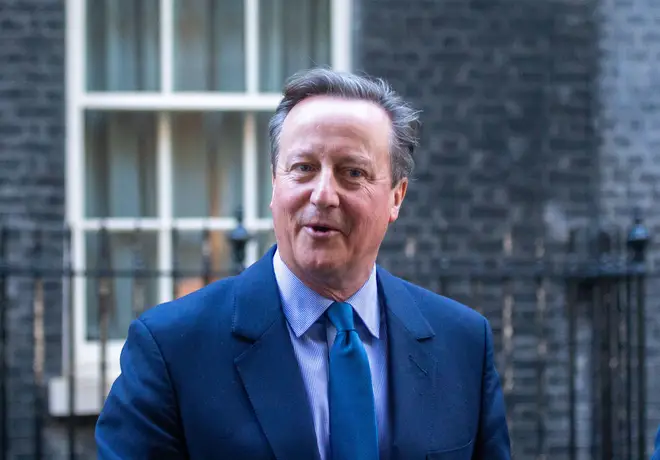
Nick Abbot 10pm - 1am
13 November 2023, 14:18

David Cameron has become the UK's Foreign Secretary, seven years after leaving office and the Houses of Parliament.
It came after the Prime Minister had fired Suella Braverman, with then-Foreign Secretary James Cleverly moving across SW1 to fill her role.
Mr Cameron stepped down from being an MP in September 2016, a few months after he quit as Prime Minister.
Read more: David Cameron made foreign secretary in shock move amid Rishi Sunak's cabinet reshuffle

Usually, and especially in recent decades, Cabinet ministers are MPs and fulfil two roles - serving their constituents, who elect them, and the Prime Minister, who appoints them to their government jobs.
But they can also be members of the House of Lords, although this is unusual in modern times.
Mr Cameron was not a peer before he was appointed to be Foreign Secretary on Monday morning, and there was no chance of him being elected to the House of Commons again at such short notice.
So Mr Sunak made him a baron, meaning he is now Lord Cameron and is entitled to sit in the upper chamber of Parliament.
In recent times, there is usually only one Cabinet minister who is a peer, rather than an MP - the leader of the Lords. Lord True currently fulfils this role.

It is quite common for Lords to be junior ministers - in fact most government departments have at least one minister who sits in the upper chamber.
They deal with government business in the Lords and answer questions posed by peers about government business.

Although unusual, it is not unprecedented for Foreign Secretaries to be peers instead of MPs.
Examples from the past century include: Lord Carrington, who served under Margaret Thatcher from 1979-82, Lord Home, who was Foreign Secretary from 1960-63, Lord Halifax, who held the post from 19308-40, Lord Reading, who served in 1931, and Lord Curzon, from 1919-24.
It was quite common in the 18th and 19th centuries for Foreign Secretaries to come from the House of Lords.
Prime Ministers also often came from the House of Lords, rather than the Commons - but the most recent example was Lord Cecil, the Marquess of Salisbury, who retired in 1902.
Lord Home became Prime Minister in 1963, but renounced his peerage in order to do so.

Labour Prime Minister Gordon Brown made Peter Mandelson a peer in 2008 so that he could serve as Business Secretary.
Lord Mandelson, one of the architects of New Labour, had quit the House of Commons in 2004 to serve as the UK's European Commissioner.

Mr Cameron will still have to appear before the House of Lords to answer questions about government business posed to him by fellow peers.
But his appearances are unlikely to be with the same regularity as in the House of Commons.
Mr Cameron is likely to delegate much of the everyday business of his department to Andrew Mitchell, the development secretary, who sits in the Commons.
But Mr Cameron will still be expected to give media interviews, so will be subject to scrutiny on that front.